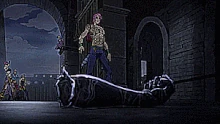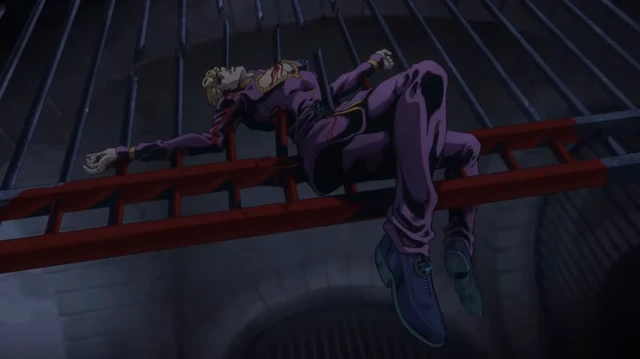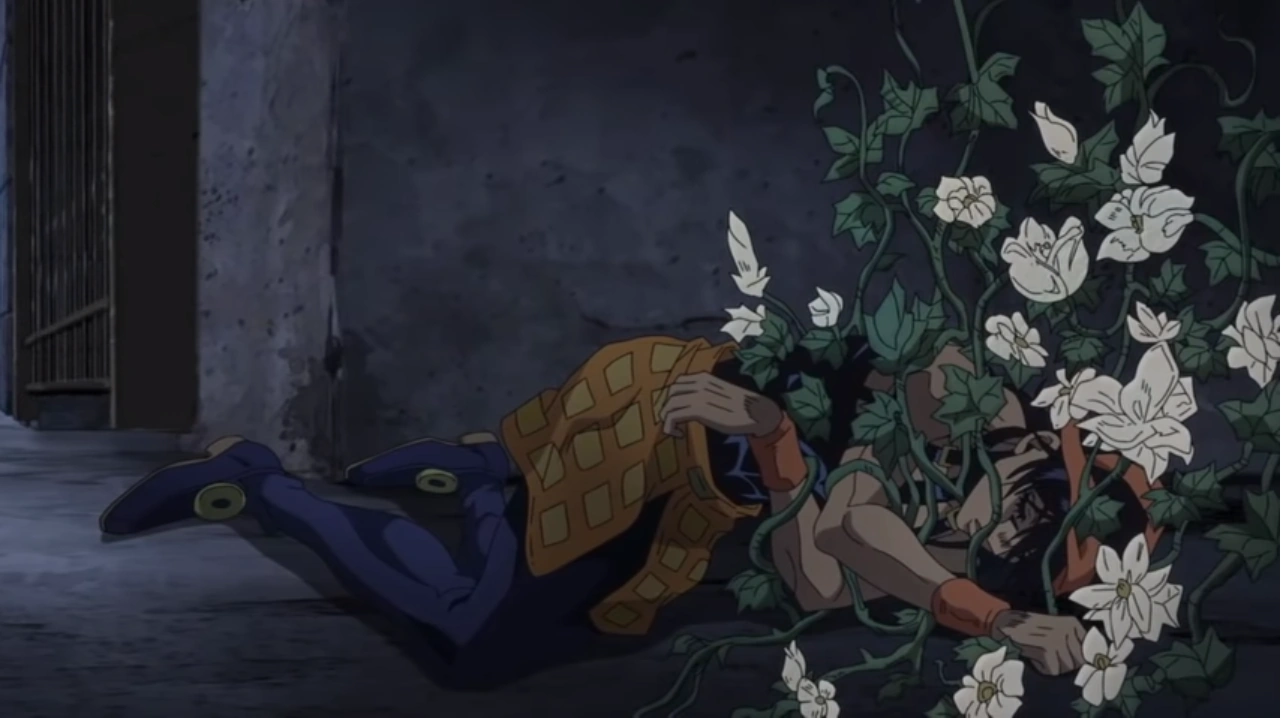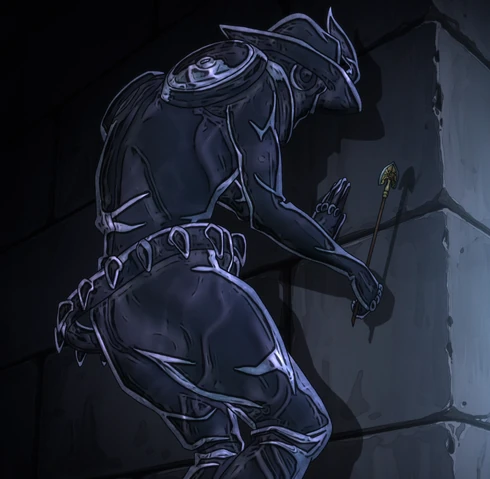JoJo's Bizarre Adventure, Golden Wind, Season 4, Episode 35: The Requiem Quietly Plays, Part 2

The previous episode sure lulled me into a sense of false security with its comedy, which I think was somewhat intentional? As both the audience and the characters try to wrap their head aroud the introduction of the brand new threat of Chariot Requiem and the wacky body-swapping effects it does on the citizens of Rome, things get a bit more light-hearted, and, honestly, the combination of comedic "stop touching my boobs" jokes and Turtle Polnareff giving recaps to the baffled gangster squad, the pace and tension was sort of... dissolved, somewhat.
So when Bucciarati-in-Diavolo's-body (I really hate the body swapping gimmick just for the sole reason that it makes writing these reviews really annoying) ends up attacking Chariot Requiem and quickly puts things together, and then the squad ends up being baffled by Chariot Requiem's ability to seemingly cause Stands to attack their own owners, it seems like we've sort of ignored Diavolo for the moment in favour of the new threat. And with the cast constantly insisting that hey, Boss-in-Bucciarati's-body is still face-flat on the ground, it's not even an unreasonable course of action.
And it definitely is an interesting ability that Chariot Requiem has. While he doesn't actively attack our heroes, any action that our heroes take to steal the arrow ends up with their Stand abilities reflected against them. Bucciarati gets choked by Sticky Fingers, while one of the Sex Pistols launches itself against Mista's own head -- and Mista would've been a goner if not for Trish using Spice Girl to soften the bullet. The other Sex Pistol gremlins are still in control while Number One is in full frenzy mode, so yeah, that's what Requiem is doing. Polnareff notes that since Requiem has gone out of control, it's just carrying out Polnareff's dying wish of defending the arrow against everyone else... but the problem, of course, is that Chariot Requiem's other abilities are going wild, including this "mind-controlling" ("soul-controlling" in older translations, I believe) power that turns all Stands against their owners.
And the moment Boss-in-Bucciarati wakes up, after a brief bit of hesitation, Mista-in-Trish just unleashes bullet hell on Bucciarati's body, causing him to collapse and fall to the ground. So far, so good... but then Narancia-in-Giorno suddenly starts talking out loud about the food he likes in his hometown, about how he plans to study, about Fugo and Abbacchio, and resolves to protect Trish to the very end.

Man, talk about death flags, huh? I'm pretty sure that the speech was extended in the anime compared to the manga.
And as Mista and Trish squabble over bullets, they realize that time has skipped, and the bullets have already clattered onto the ground. And while we have a brief comedy moment when Mista freaks out over four bullets being on the ground, everyone else has their eyes on Boss-in-Bucciarati, and they don't see King Crimson being activated... and King Crimson has a short range anyway.
And then, of course, the surprise revelation that Narancia-in-Giorno was just killed off brutally off-screen, impaled bloodily on a bunch of railings above them, pierced like shishkebab.
It's a random, quick, brutal and pointless death, and it's in such stark contrast with the other two deaths we've seen so far in Vento Aureo. Bucciarati's death is equitable to someone who's suffering from a terminal condition, and is just planning to try to do his damnadest to finish whatever he can do as his body breaks down. Abbacchio's death was sudden, but he fights and rebels against fate, buying a few precious seconds to hammer home a crucial point of victory to tell his comrades, trusting them to use the information to beat their enemy. Narancia's death? It's just cruel, brutal, out of nowhere, and definitely there mostly for shock value.
Back when I read Vento Aureo for the first time, I remembered complaining about this. Not even an epic last stand, not even a token effort of resistance... hell, Narancia himself isn't even aware of his death, as far as we know! But looking back... I still don't like the death scene, but I can appreciate just how different it is to the other deaths in Vento Aureo.
Everyone is freaking the fuck out, and most notably is Giorno, who is openly weeping -- something he never quite did even when Abbacchio is killed. It's sort of a wake up call. The fact that they didn't even take into consideration that the boss is two persons (something Polnareff knew and could've told them earlier), or that they essentially let their guard down when fighting such an overwhelmingly powerful Stand... it's definitely a well-executed scene. The fact that it's Narancia, the most childish and arguably least sinful of the gangsters, is also a gut-punch.

Giorno's desperate healing, only to find that all he healed is an empty shell... it's heartbreaking. Granted, it's sort of spoiled by the fact that it's just a narrative shortcut to get Giorno back into his own body with a handwave of "it's so empty I could slip back in", but it's still pretty well done as Narancia's original body just drops down dead. We get this beautiful anime-exclusive scene of Aerosmith's shadow flying over Fugo just wandering the alley in front of Bucciarati's favourite restaurant (awww) and the place where Abbacchio died, before turning into a bird.
It's at this point that turtle Polnareff (who isn't mourning, because he barely knew these kids) realizes what's going on -- the two Diavolo personalities jumped into different bodies, all the while rattling on and on in a very Araki information dump about the so-and-so research in Germany where a split presonality disorder caused physical changes in the patient. Polnareff quickly realizes that Doppio's soul is in Bucciarati's body, but Diavolo and King Crimson? He's... elsewhere. And Narancia's taken out first because he's the one with a radar. It's a neat showcase of them actually having a three-way fight between our heroes, Diavolo and Requiem. Diavolo's not going to stay quiet just because they have another threat to deal with.
Leaving Narancia's corpse with a bunch of Gold Experience flowers and solemn promise to bring him home after all this, as well as the wouded Doppio-in-Bucciarati, our heroes goes off to hunt down Requiem. We get a pretty hilarious scene where one of the recurring background characters in these two episodes, a rapist criminal who finds his body inside the policeman that arrested him, attempts to "arrest" Trish... but Mista-in-Trish just fucking shoots him in the fucking face, which is kind of unnecessary but also fucking hilarious.
As our heroes catch up with Requiem, they realize that civilians can see and touch Requiem, and, hell, it's even physically weak, but any attempt to attack and steal the Stand away is met with resistance, including a very awesome shot of Gold Experience's fingers and face sprouting out of the void in response to Giorno reaching out towards Requiem, with a very, very welcome return of the ominous katakana sound effect that we haven't seen in a while. The episode ends with Polnareff, who claims to not be a Stand user since he lost his stand, grabbing the arrow's shaft with his turtle mouth, yelling and telling Mista to pierce his Stand with the arrow as Requiem charges towards Polnareff to reclaim the arrow.
It's... kind of weird, because presumably Sex Pistols Requiem would be as unpredictable and uncontrollable as Chariot Requiem, and why Mista specifically? Also, Polnareff has lost Silver Chariot, but doesn't he still have the turtle's Stand, as seen early on in episode 34 when Giorno-in-Narancia is in the key? Eh.

Overall, though, the episode's main point of focus is definitely the re establishment of Diavolo as a hero killer with Narancia's abrupt death. It's a point of contention that I'm sure a lot of people would say is a wasted moment and something that could've been done better, but I do think that the sheer abruptness and the sheer suddenness of death is part of Narancia's death's point. Narratively it perhaps could've been done a bit better, but I would argue that as part of this long climax, the sudden death as well as the cast barely having any time to mourn because they still have to figure out how to deal with Requiem and Diavolo is far more pressing. And, granted... Vento Aureo's climax isn't the most tightly-plotted one, especially compared to how much better the climax for Parts II, III and IV flows. We've not seen just how... bizarre this climax can be, to say the least. And honestly, as much as I love Part V, the sheer amount of the climax that hinges on "we forget a crucial piece of information" or random new stuff being thrown at us is going to be something that's either going to not bother you at all or will ruin the climax for you.
No comments:
Post a Comment